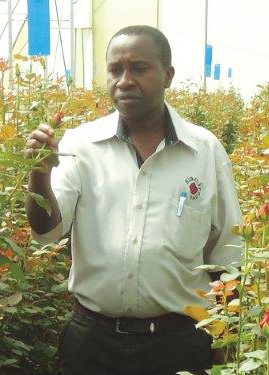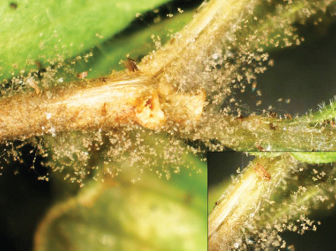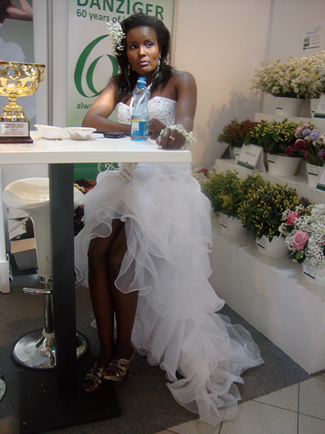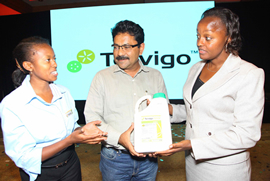Who is Andrew Tubei? (Background-personal and as a grower)
 I am the production and Technical Manager of Maasai flowers, one of the units of Sian group of farms. I’m enterprising and multi skilled grower with more than 13 years in the production of roses, Zantedeschia/ Calla lily and summer flowers. I believe in working objectively and business first mind frame which in turn helps me to improve efficiency, effectiveness and productivity. I work in a challenging and dynamic position with a solid firm that recognizes individual growth and personal contribution to the realization of company objectives.
I am the production and Technical Manager of Maasai flowers, one of the units of Sian group of farms. I’m enterprising and multi skilled grower with more than 13 years in the production of roses, Zantedeschia/ Calla lily and summer flowers. I believe in working objectively and business first mind frame which in turn helps me to improve efficiency, effectiveness and productivity. I work in a challenging and dynamic position with a solid firm that recognizes individual growth and personal contribution to the realization of company objectives.
You have been growing and selling flowers for most of your professional life, if you would have to give your remarks about being a grower, what would they be?
The production of cut flowers is both capital and knowledge – intensive. Due to the extreme sensitivity of the product, professional management and constant vigilance is needed during all phases of growing, packaging and shipping. Because fresh cut- flowers do not undergo any processing between harvesting and sale, growers are essentially producing a finished product. Cut flowers sold in direct markets often retain the identity of the individual grower, and growers who can successfully differentiate their products can attain profit levels far in excess of other producers.
 Listening to the continuity announcer, she announced weather forecast for the next five days as cloudy, cool and rainy weather conditions. These low light, humid conditions combined with a near full greenhouse floral crops meant Botrytis blight outbreaks. My crop was especially vulnerable now since they had a full flower canopy filled to the maximum allowable space.
Listening to the continuity announcer, she announced weather forecast for the next five days as cloudy, cool and rainy weather conditions. These low light, humid conditions combined with a near full greenhouse floral crops meant Botrytis blight outbreaks. My crop was especially vulnerable now since they had a full flower canopy filled to the maximum allowable space.
 As the curtain of the 4th edition of the International Floriculture Trade Expo (IFTEX) 2015 opens from 3rd to 5th June, there will be no room for any shortcoming that may hamper its success. All minds and hands that know what it entails have been up and down trying to put different pieces together to make what can be seen as the true spirit of the regional horticultural industry.
As the curtain of the 4th edition of the International Floriculture Trade Expo (IFTEX) 2015 opens from 3rd to 5th June, there will be no room for any shortcoming that may hamper its success. All minds and hands that know what it entails have been up and down trying to put different pieces together to make what can be seen as the true spirit of the regional horticultural industry.
 It was pomp and dance as flower growers welcomed the entry of a first class nematicide for ornamental products. The launch came with an almost audio recorded oratory of Marcel Breedeveld, Product development Manager, Europe Africa Middle East, Lawn and Gardens not previously heard in Kenya.
It was pomp and dance as flower growers welcomed the entry of a first class nematicide for ornamental products. The launch came with an almost audio recorded oratory of Marcel Breedeveld, Product development Manager, Europe Africa Middle East, Lawn and Gardens not previously heard in Kenya. I am the production and Technical Manager of Maasai flowers, one of the units of Sian group of farms. I’m enterprising and multi skilled grower with more than 13 years in the production of roses, Zantedeschia/ Calla lily and summer flowers. I believe in working objectively and business first mind frame which in turn helps me to improve efficiency, effectiveness and productivity. I work in a challenging and dynamic position with a solid firm that recognizes individual growth and personal contribution to the realization of company objectives.
I am the production and Technical Manager of Maasai flowers, one of the units of Sian group of farms. I’m enterprising and multi skilled grower with more than 13 years in the production of roses, Zantedeschia/ Calla lily and summer flowers. I believe in working objectively and business first mind frame which in turn helps me to improve efficiency, effectiveness and productivity. I work in a challenging and dynamic position with a solid firm that recognizes individual growth and personal contribution to the realization of company objectives.